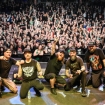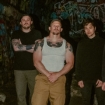"I don't believe in an afterlife, or believe in any sort of religion, so it's really hard for me sometimes to find purpose in what I do," says Harm's Way singer James Pligge. "And what does it all really mean if we're all going to be dead?"
Pligge is addressing the bleak themes of "Sink," a punishing, but philosophical, tune from the Chicago hardcore band's new and fourth album, Posthuman (out February 9 via Metal Blade). And while he matter-of-factly acknowledges the streak of nihilism behind his belief that we're nothing more than just "bodies on earth," he's still making the most of his own mortal shell while he's here. Part of that has to do with playing in Harm's Way, of course, but he's also found purpose through powerlifting.
Pligge's interest in fitness won't come as a shock to anyone who's witnessed a Harm's Way show. Do a quick image search on the vocalist and you'll see dozens of shirtless pics of him punching his way through live performances, showing off a chiseled, barrel-armed physique; look on social media and you'll find numerous fans proclaiming their hope that they'll look just as jacked one day. But Pligge is quick to point out that weightlifting is much more than a superficial pursuit, citing his time in the gym and in powerlifting competitions as vital mental exercise that helps him cope with chronic feelings of depression and isolation.
"Throughout my whole life, I've been involved in sports, and been involved in music — those two things always went hand in hand for me. I just saw those things as really positive releases for my daily anxieties," Pligge explains to Revolver after coming home from a day spent instructing volleyball at a local high school — he takes on various substitute teaching gigs when Harm's Way isn't on the road.
"I struggled with a lot of social anxiety when I was younger," he continues. "It was very easy for me to take those frustrations out on the sports field, however that transitioned later when I was in high school to lifting weight. I got into bodybuilding, and then I got into powerlifting. I've always been very pro body image and having confidence in how you look to make you feel better."
Discipline and structure are crucial in helping him find equilibrium in his life, and the frontman credits his father with helping instill the strong work ethic that he applies to everything from teaching and music, to lifting and his drug-free lifestyle.

"I started working with my dad when I was nine or ten," says Pligge. "He worked at a tennis club, it was a labor job on a clay tennis court. There was a lot of lifting, and a lot of maintenance. I learned that it's important to be on time for work. It's important to get your work done, to not be lazy."
Pligge's thoughtful, diligent approach has paid off. After a decade of steady recording and touring, he's honed his voice into a forceful wrecking ball, evidenced throughout Posthuman as he screams above the swollen breakdowns of "Human Carrying Capacity," or the eerie, industrial-tinged slink of "The Gift." Life on the road has only strengthened the singer's rigid commitment to fitness, as well: To maintain his mental clarity and imposing physical prowess (he's currently able to deadlift upwards of 600 pounds), he adheres to a strict workout regimen, no matter what.
"Once you get to touring six or seven months of the year, you have to incorporate things from your normal life," he adds, noting how grabbing a nationwide YMCA pass means he can duck out after soundcheck for squat and bench routines with drummer Chris Mills. "We found a way to really make it work. Whether I take the van or get an Uber, I try to go three to four times a week."

While these days he often works out with his bandmate, Pligge's early lifting sessions were spent solo, arguably a response to the general anxiety he felt in his youth. "I just had a sense that I didn't like people," he recalls. "I didn't want to be around anyone, didn't want to go to parties." Weight training certainly helped boost his confidence, but it wasn't until he immersed himself in Chicago's punk and hardcore scene that he connected with other social misfits, and found the mind/body/music balance that gives his life purpose to this day.
"I think it's important to strive to better yourself physically and mentally every day," says Pligge. "That's how I view lifting. It's a progressive thing. It's something that keeps me rooted. It's something that helps me release any daily frustrations that I have. On top of it, I'm fortunate to have the band to also release those things. Writing lyrics helps me get out the negative so that I can pursue life in a more positive way, so that I'm not constantly sad or depressed."








